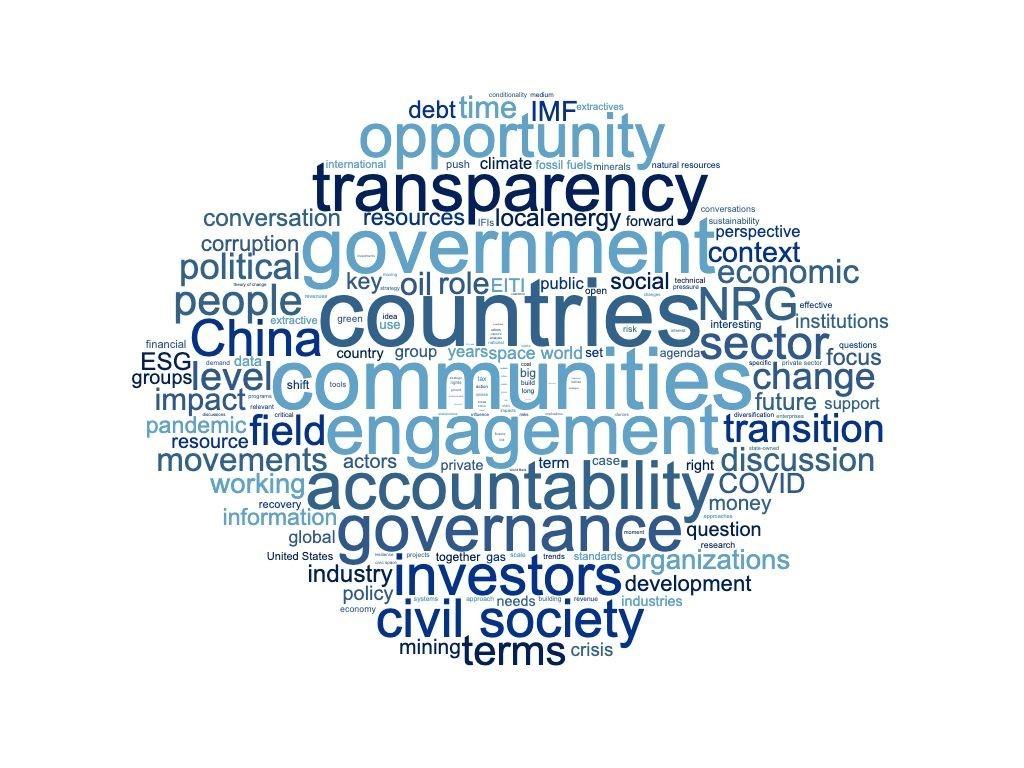
Business as Usual Is Not an Option: The Future of Natural Resource Governance
This is the first in a series of posts on the future of natural resource governance originally published by the Brookings Institution that builds upon a virtual October 2020 dialogue co-hosted by the Leveraging Transparency to Reduce Corruption project, the Transparency and Accountability Initiative and NRGI. They are intended to spark discussion and thinking around what the field needs to do newly, differently, more of, or better in the years and decades to come—not as a comprehensive summary of the discussion, nor as a set of action items to be followed. A word cloud of the event transcript, featured in this piece, highlights issues prioritized by participants during the discussion. The second post is here, and the third post is here.
The effects of the COVID-19 pandemic have been dire around the world, and resource-rich countries are no exception. Arguably, lower-income resource-dependent countries face the direst challenges. A “perfect storm” of the pandemic itself, acute governance challenges, socioeconomic crises, and a drop in commodity prices (particularly oil) has left resource-rich countries struggling to cope. These lower prices for oil and certain metals and reduced investment prospects translate into multiple risks, including a “race to the bottom” in terms of reduction of transparency and governance standards and social and environmental protections.
Further, and fundamentally, democratic institutions are under threat in some of these countries, as in other settings around the globe. Some governments have seized the crisis to further repress civil society and constrain consultation processes with local communities. At the same time, pre-pandemic challenges have not gone away, but are further magnified with the onset of COVID-19. These include the urgent need to mitigate climate change through transitioning from fossil fuels to green energy; rising poverty levels; and persistent corruption and misgovernance in the extractive industries of oil, gas, and mining.
Against this daunting backdrop of multiple overlapping crises, the Leveraging Transparency to Reduce Corruption project, the Natural Resource Governance Institute, and the Transparency and Accountability Initiative hosted a virtual convening in late October 2020 to discuss the future of natural resource governance. Over 40 participants came from around the world and included experts in natural resource governance as well as the development, climate, governance, and transparency fields more broadly, with the goals of opening new ways of thinking about natural resource governance global (and local) architecture and better responding to the short- and long-term challenges posed by COVID-19.
Five specific themes emerged from the discussion that we will explore in further blog posts:
The nature and magnitude of the shifts in the world require the natural resource governance field to rethink and evolve in major ways. The field—i.e., the ecosystem of actors who engage on natural resource governance and sustainable development in resource-rich countries—has proven it can adapt to context and to lessons learned throughout the past three decades. From an early focus on extractive revenue and tax transparency, the field has expanded disclosures across the natural resource value chain. These now include contracts, beneficial ownership information, social impacts of extraction, and more. (Outstanding gaps include disclosure of fossil fuel reserves, production costs, and climate risks.) Transparency gains are critical, yet insufficient to foster major change; therefore, another adaptation has been a scaled-up focus on participation and accountability efforts that take advantage of disclosed data. Today, significant pivots are required in response to massive geopolitical, economic, and industry shifts. Important gains in the past decade cannot be an excuse to rest on our laurels. In order to attain progress ahead, a major shift is needed in the strategies, actions, and tools that the field has traditionally relied upon.
One part of this strategic pivot is the need to identify new multistakeholder coalitions for change. The core of the natural resource governance field—pushing for greater transparency and accountability, increased technical and oversight capacity, stronger anti-corruption initiatives, and more—will still be needed going forward. Effective natural resource governance is not, of course, only a goal in and of itself; it is also an important part of achieving larger societal goals of poverty reduction and sustainable development. Therefore, to confront the magnitude of the crises ahead, the field will need to form deep strategic linkages with related actors—ranging from international financial institutions, government representatives, and investors to activists and thinkers in civil society movements such as climate, corruption, human rights, gender, and tax—where there are points of engagement and shared societal goals.
In the years ahead, transparency, accountability, and participation must align with the need to address inequality, sustainability, resilience, and justice. To advance these intertwined agendas, the natural resource governance community will need new strategies, new evidence, new coalitions, and new tools. The pandemic poses an opportunity to reimagine the elements of this pivot and think through the strategies and tactics needed to get there. The blog posts that will follow explore what some of those strategies might involve.
Read the next entry in this series here, and the third entry here. Share your thoughts on these and other issues related to the future of natural resource governance on Twitter using #FutureOfNRG.
Norman Eisen is a senior fellow at the Brookings Institution. Michael Jarvis is the executive director of the Transparency and Accountability Initiaitive. Suneeta Kaimal is the interim president and CEO at the Natural Resource Governance Institute (NRGI). Daniel Kaufmann is a nonresident senior fellow at Brookings and the president emeritus of NRGI. Kelsey Landau is a research analyst at Brookings. Allison Merkel is an open governance research intern at Brookings. Robin J. Lewis is a senior research associate at Brookings. Mario Picon is a program director at Results for Development. Erica Westenberg is the governance programs director at NRGI.
The effects of the COVID-19 pandemic have been dire around the world, and resource-rich countries are no exception. Arguably, lower-income resource-dependent countries face the direst challenges. A “perfect storm” of the pandemic itself, acute governance challenges, socioeconomic crises, and a drop in commodity prices (particularly oil) has left resource-rich countries struggling to cope. These lower prices for oil and certain metals and reduced investment prospects translate into multiple risks, including a “race to the bottom” in terms of reduction of transparency and governance standards and social and environmental protections.
Further, and fundamentally, democratic institutions are under threat in some of these countries, as in other settings around the globe. Some governments have seized the crisis to further repress civil society and constrain consultation processes with local communities. At the same time, pre-pandemic challenges have not gone away, but are further magnified with the onset of COVID-19. These include the urgent need to mitigate climate change through transitioning from fossil fuels to green energy; rising poverty levels; and persistent corruption and misgovernance in the extractive industries of oil, gas, and mining.
Against this daunting backdrop of multiple overlapping crises, the Leveraging Transparency to Reduce Corruption project, the Natural Resource Governance Institute, and the Transparency and Accountability Initiative hosted a virtual convening in late October 2020 to discuss the future of natural resource governance. Over 40 participants came from around the world and included experts in natural resource governance as well as the development, climate, governance, and transparency fields more broadly, with the goals of opening new ways of thinking about natural resource governance global (and local) architecture and better responding to the short- and long-term challenges posed by COVID-19.
Five specific themes emerged from the discussion that we will explore in further blog posts:
- The critical role for resource governance in the energy transition
- Centrality of politics, power, and state capture
- The role of investors
- Repression of civil society
- Complementarity between international- and local-level actors
The nature and magnitude of the shifts in the world require the natural resource governance field to rethink and evolve in major ways. The field—i.e., the ecosystem of actors who engage on natural resource governance and sustainable development in resource-rich countries—has proven it can adapt to context and to lessons learned throughout the past three decades. From an early focus on extractive revenue and tax transparency, the field has expanded disclosures across the natural resource value chain. These now include contracts, beneficial ownership information, social impacts of extraction, and more. (Outstanding gaps include disclosure of fossil fuel reserves, production costs, and climate risks.) Transparency gains are critical, yet insufficient to foster major change; therefore, another adaptation has been a scaled-up focus on participation and accountability efforts that take advantage of disclosed data. Today, significant pivots are required in response to massive geopolitical, economic, and industry shifts. Important gains in the past decade cannot be an excuse to rest on our laurels. In order to attain progress ahead, a major shift is needed in the strategies, actions, and tools that the field has traditionally relied upon.
One part of this strategic pivot is the need to identify new multistakeholder coalitions for change. The core of the natural resource governance field—pushing for greater transparency and accountability, increased technical and oversight capacity, stronger anti-corruption initiatives, and more—will still be needed going forward. Effective natural resource governance is not, of course, only a goal in and of itself; it is also an important part of achieving larger societal goals of poverty reduction and sustainable development. Therefore, to confront the magnitude of the crises ahead, the field will need to form deep strategic linkages with related actors—ranging from international financial institutions, government representatives, and investors to activists and thinkers in civil society movements such as climate, corruption, human rights, gender, and tax—where there are points of engagement and shared societal goals.
In the years ahead, transparency, accountability, and participation must align with the need to address inequality, sustainability, resilience, and justice. To advance these intertwined agendas, the natural resource governance community will need new strategies, new evidence, new coalitions, and new tools. The pandemic poses an opportunity to reimagine the elements of this pivot and think through the strategies and tactics needed to get there. The blog posts that will follow explore what some of those strategies might involve.
Read the next entry in this series here, and the third entry here. Share your thoughts on these and other issues related to the future of natural resource governance on Twitter using #FutureOfNRG.
Norman Eisen is a senior fellow at the Brookings Institution. Michael Jarvis is the executive director of the Transparency and Accountability Initiaitive. Suneeta Kaimal is the interim president and CEO at the Natural Resource Governance Institute (NRGI). Daniel Kaufmann is a nonresident senior fellow at Brookings and the president emeritus of NRGI. Kelsey Landau is a research analyst at Brookings. Allison Merkel is an open governance research intern at Brookings. Robin J. Lewis is a senior research associate at Brookings. Mario Picon is a program director at Results for Development. Erica Westenberg is the governance programs director at NRGI.
Authors


Daniel Kaufmann
President Emeritus

Suneeta Kaimal
President and Chief Executive Officer




Erica Westenberg
Governance Programs Director


